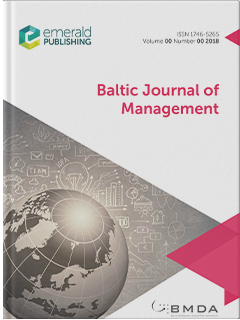About research
Prof. dr. Vita Akstinaitė
Vice-President for Research and Faculty

Research areas
Management
Sustainable HRM and Future of Work
In the context of current rapid economic, geopolitical, social, and technological changes, sustainable HRM and adapting to new work environment play a critical role in fostering economic and social development. ISM researchers were among the first scholars to engage in research in this domain and have made substantial contributions to it, such as a paper by Dwertman, Goštautaitė, Kazlauskaitė and Bučiūnienė on corporate benefits of employing persons with disabilities published in Academy of Management Journal (FT list, AJG 4*), a paper by Shao, Goštautaitės, Wang ir Ng (2022). on workforce aging in Personnel Psychology (AJG 4*), etc.
Future research will focus on such subthemes as human capital sustainability (Bučiūnienė & Yerlitas, 2022), employability across life-span and career sustainability (Goštautaitė & Liubertė), caring for employee wellbeing (Kazlauskaitė, Poškutė, Goštautaitė), employment of persons with disability (Bučiūnienė & Lolat), employee volunteering and engagement in NGO activities (Bučiūnienė, Petreikienė, Pranaitytė), HR practice and culture developments in the new work environment (Kazlauskaitė & Jonynienė).
Environmental Effects on Wellbeing and Performance
Built environment plays a relevant role in sustaining employee and public health, wellbeing and performance, building stronger organizations and healthier communities, and protecting the natural environment. ISM researchers have contributed to the attainment of these goals through studies of such sub-themes as physical office environment effects on occupational wellbeing, nature effects on public and individual health, food consumption and cognitive performance. Research output under this theme includes a systemic literature review of office environment effects on occupational wellbeing by Kazlauskaitė, Martinaitytė, Lyubovnikova and Augutytė-Kvedaravičienė published in International Journal of Management Reviews (AJG 3) and a series of papers by Joye on nature effects.
Future research will continue focusing on environmental effects on public and employee health (Joye & Lisauskienė), ethical behaviour (Joye & Muravjovas), and employee well-being and performance (Kazlauskaitė & Augutytė-Kvedaravičienė).
The Effects of Emerging Technologies on the Nature of Work
Emerging technologies (ET) require business model and system reconfiguration. ET adoption is supposed to boost efficiency and economic performance, but it often backfires. Researchers (Bučiūnienė, Goštautaitė, Liubertė, Remeikienė, Qureshi) have examined ET effects (e.g. robotics, IT, 3D printing), organizational challenges of ET adoption and neutralizing of its negative effect on employee well-being, ET adaptability, and the role of HRM in ET adoption. The findings have been presented at top conferences, and papers are in the review process or accepted for publishing in Organization Studies (FT list, AJG 4*), Academy of Management Discoveries (AJG 3), The International Journal of Human Resource Management (AJG 3).
Future research will investigate implementation and outcomes of AI, robotics, 3D printing, and other technologies in health care (robotic surgery), manufacturing, construction, education, etc., and human-ET interaction.
AI Methodologies for Data Management and Decision-Making
ISM is rapidly expanding research under this theme. Akstinaitė, with the world’s top scholars in this field, leads this theme. Akstinaitė and Sadler Smith’s paper on advanced management research methodologies using computational linguistics and machine learning won the Best Paper Award in Research Methods SIG at 2022 British Academy of Management conference.
Articles based on AI and machine learning methods have been published in top journals such as Journal of Business Ethics (FT-50 list, AJG 4*), Human Resource Management Journal (4* AJG), British Journal of Management (AJG 4), etc. Miniotaitė and Pilkienė project “The use of AI and machine learning solutions for the development of a human resources search, selection, and evaluation platform” applies AI research to management practice.
ISM researchers will continue to expand their research using advanced AI-related methods such as machine learning and computational linguistics. These techniques will be applied in a variety of research settings and contexts. To further strengthen the expertise of ISM researchers in this area, a course on “Using AI/Machine Learning in Research” will be organized in June 2023, which will be taught by Vlachos from University of Lausanne, a renowned expert in the field.
The role of AI in Leadership
A number of leadership and AI-related studies have been conducted at ISM. Sadler-Smith ir Akstinaitė used computational linguistics and machine learning to study leadership hubris. Their findings were published in Organization & Environment(AJG 3). Some ongoing and upcoming studies under this theme will use cutting-edge technology, i.e. deep neural networks, to develop an algorithm for measuring leadership-related abilities at-a-distance, from one’s speech. This research will be conducted by Akstinaitė in collaboration with the world’s leading leadership researcher Antonakis, University of Lausanne (h-index=53). ISM scholars will also seek to contribute to a better understanding of new leadership theories, such as Industry 4.0 leadership, horizontal leadership, virtual leadership, etc.
Leadership and Organizing in the Era of Remote Work
ISM researchers also address leadership and organizing issues in the changing work environment through studies in the context of remote work. Nakrošienė, Bučiūnienė & Goštautaitė were among the first scholars to study remote work. Their paper published in International Journal of Manpower (AJG 2) falls under top 10% most cited works in management. Bučiūnienė & Kazlauskaitė study macro and mezzo-level factors affecting remote work across Europe (forthcoming chapter to be published in Routledge Innovation and Technology Horizons book series). A recent Nordforsk-funded project (2023-2026) will study leadership in the under-researched hybrid work context. Moreover, this 4-year study is to be conducted across three countries: Lithuania, Norway and Sweden.
Facilitating Value Creation and Leadership in Different Contexts
ISM researchers address various value co-creation and leadership topics in different contexts. Value co-creation is studied in the field of education, where Auruškevičienė, Misiūnas, Židonis, Šidlauskienė and Survilaitė study citizen involvement in the co-creation of secondary education services. Alonderienė, Alonderienė, Müller, Chmieliauskas, Pilkienė, Šimkonis et al. investigate value co-creation via project network governance.
Leadership topics are explored in different contexts too. Alonderienė, Müller, Chmieliauskas, Pilkienė, and Šimkonis study horizontal leadership in projects. They have published their research in IEEE Transactions on Engineering Management (AJG 3) and Production Planning & Control (AJG 3). Further, Akstinaitė in collaboration with Sadler-Smith investigated leadership complexities at challenging times, including COVID-19 (Leadership, AJG 2). Minelgaitė & Škudienė (2018) focused on leadership in business in Lithuania and global institutions. Jaškienė & Bučiūnienė explored academic leadership. Ryazanova & Jaškienė provided evidence-based advice for academic leaders on research management (Research Policy, FT50, AJG 4*).
Marketing and Consumer Behavior
Finance and Economics
Micro and Macroeconomic Determinants of Growth and Sustainable Development
ISM researchers are studying how monetary and fiscal policies affect sustainable growth and social development. In papers published in Quarterly Journal of Austrian Economics (AJG 1) and The Quarterly Review of Economics and Finance (AJG 2), Žukauskas (in collaboration with Hülsmann) examined the effects of monetary policy on financial asset prices. Barauskaitė-Griškevičienė & Nguyen’s research in Empirical Economics (AJG 2), Economic Modelling (AJG 2), and International Journal of Finance and Economics (AJG 3) examined aggregate economic fluctuations and direct and indirect network effects. Klimavičienė et al. examined how foreign direct investment affects economic growth. Poškutė’s Horizon 2020-funded research on social effects of demographic changes also addressed sustainability. Ginevičius, Noga, Žemaitis et al. examined how electricity consumption affects different industries.
Future research will investigate industry and economic performance determinants and strategies for sustainable economic growth and social equity.
Financial Economics, Financial Technologies and Sustainability
Financial institutions and markets are shaped by economics, technology, and sustainability. Kaminskas, Šarapovas, Kušlys, Hashimoto & Poškutė have contributed to this field by studying macro-financial issues like central bank fiscal policy communication, financial institution development, financial centres, and pension fund systems. Lisauskienė, Darškuvienė, Mariničevaitė, & Katkov examined fintech innovations and investment behavior. Darškuvienė, Pranckėnaitė, Klimavičienė, Misiūnas, Kundelis & Nasteckienė studied corporate finance and governance, including the behavioral effects of company ownership on debt and financial distress. Urban Studies (AJG 3), European Urban and Regional Studies (AJG 3) and other outlets have published their works.
Future research will examine robotization effects on financial investors’ behavioral biases, company ownership impact on debt and financial distress, and financial performance and governance effects on sustainability.
Labour Markets, Automation and Economic Growth
ISM has investigated novel approaches to the potential impact of automation on labor markets and employment, trade-offs between economic growth and unemployment (Boyd, Huettinger, Šarapovas, Kušlys, Zirgulis), automation and occupational mobility (Christenko), taxation of robots (Huettinger, Boyd), electoral rules on public R&D (Krūminas), and the socio-economic impact of research and development. International Journal of Social Economics (AJG 1), Futures (AJG 2), Review of Economics and Economic Methodology, and Constitutional Political Economy (AJG 1) have published their research.
Further research on labor markets, employment, and automation will help explain conceptual issues, economic and social issues, and public policy implications of fuller automation.
Research and other information
Baltic Journal of Management
The Baltic Journal of Management publishes high quality peer-reviewed research on major disciplines in management. Initially launched as a publication outlet for research focussing on the Baltic region, the journal has rapidly grown to publish quality international perspectives on contemporary matters and emerging fields in management.
The Baltic Journal of Management welcomes empirical and conceptual articles, including literature reviews, and encourages research into interdisciplinary, international and comparative standpoints on contemporary management issues.
Coverage includes, but is not restricted to:
- Strategic and operations management
- International business and management
- Marketing and consumer studies
- Human resource management and organisational behaviour
- Entrepreneurship and management of innovation
- Innovation, digital technology, and business and marketing analytics
- Corporate social responsibility and sustainability
- Corporate governance
The journal operates a double-blind peer review system whereby each paper is reviewed by a minimum of two referees. To avoid processing delays all submitted papers must follow the author guidelines and count between 6000 and 9,000 words in length. Submissions that do not follow the guidelines or are not judged suitable for the standards of the journal will not be considered. For further information please see here.
CALL for papers to a special issue Sustainability marketing and sustainability management: Exploring new perspectives on sustainable development.
The Journal is indexed and abstracted in:
- Journal Citation Reports®;
- Social Sciences Citation Index ®;
- Social Scisearch ®;
- Scopus;
- Cabell’s Directory of Publishing Opportunities in Management & Marketing;
- Electronic Collections Online; International Bibliography of Social Sciences;
- ProQuest;
- ReadCube Discover;
- Zetoc (British Library)
The Journal is ranked by:
- Australian Business Deans Council (ABDC) 2013 Journal Quality List;
- Australian Research Council (ERA) 2015 Journal List;
- BFI (Denmark); Index Copernicus (Poland);
- JourQUAL (Germany);
- Norwegian Social Science Data Services;
- The Chartered Association of Business Schools’ (CABS) Academic Journal Guide 2021 (The Guide);
- The Publication Forum (Finland)
Editor
Prof. Rūta Kazlauskaitė
ISM University of Management and Economics
Arklių g. 18
01305 Vilnius, Lietuva
E-mail ruta.kazlauskaite@ism.lt
Contacts





